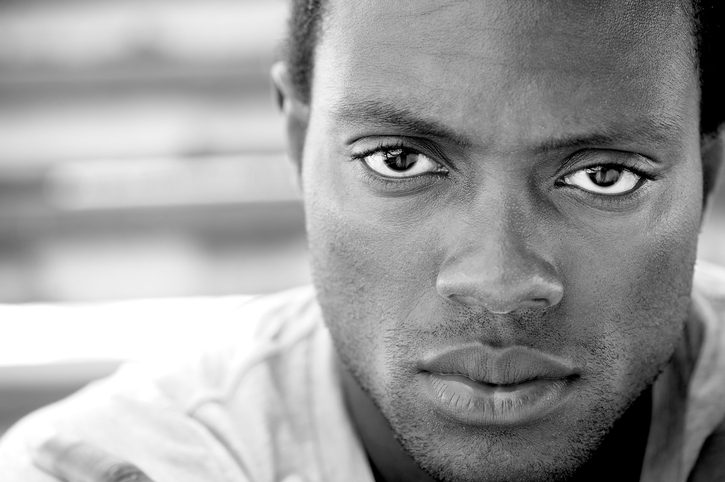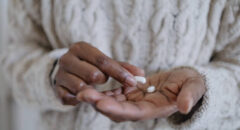 October is Depression Awareness Month and Kid Cudi’s recent tweet about his personal struggle with depression has brought the issue of depression and specifically depression in African-American men to the forefront. Depression as a disorder has been recognized for centuries with many documented cases of what was then called Melancholia. While conversations about depression have become more commonplace in the general population, there is still an undeniable stigma when it comes to discussing depression in the African-American community. This is especially true when it comes to depression and African-American men.
October is Depression Awareness Month and Kid Cudi’s recent tweet about his personal struggle with depression has brought the issue of depression and specifically depression in African-American men to the forefront. Depression as a disorder has been recognized for centuries with many documented cases of what was then called Melancholia. While conversations about depression have become more commonplace in the general population, there is still an undeniable stigma when it comes to discussing depression in the African-American community. This is especially true when it comes to depression and African-American men.
What Is Depression?
Okay, I am a doctor so I’ve got to get some of the nerdy doctor stuff out of the way. Before we discuss depression, we really should define what depression is. Depression is not just feeling blue or down from time to time, everyone feels this way at some point in their lives. Depression, rather, is a long-term condition (lasting months to years) that results from an imbalance in the brain’s neurotransmitters (serotonin, dopamine, epinephrine and norepinephrine) combined with genetic factors, life stressors and other medical conditions. Depression leads to an inability to function normally in daily life. The most common symptoms of depression include:
1. Sleep disturbances (either insomnia or hypersomnia);
2. A loss of interest in activities that used to be or should be pleasurable;
3. Feelings of intense guilt and/or sadness;
4. Loss of energy/lethargy;
5. Inability to concentrate or focus on tasks/work;
6. Changes in appetite (either loss of appetite or over-eating);
7. Feelings of irritability and/or anxiety;
8. Thoughts of self harm and/or suicidal thoughts (passive or active);
Depression also often has physical symptoms including:
1. Headaches;
2. Muscle, back and joint pain;
3. Chest pain;
4. Abdominal pain;
5. Digestive problems;
The incidence of depression varies widely with the United States being the most depressed country (approximately 17% of Americans report at least one depressive episode in their lifetime) and Japan being the least depressed country (only 3% of its population report at least one major depressive episode in their lifetime).
Women are twice as likely to be affected by depression than men, and while African Americans only make up 12% of the U.S. population, we account for 33% of U.S. depression cases. While we are more likely to experience depression, we are less likely to seek treatment. As a matter of fact, only 10% of African-American men seek treatment for depression. That means that 90% of African American man with depression never report their symptoms and never seek medical care. Like most things in medicine and life however, this statistic doesn’t just exist in a vacuum.
History of Black Men & Depression
Historically, African Americans have almost been forced to suppress their depression as a coping and survival mechanism. During slavery, only the “strong” (physically and emotionally) survived; weakness literally meant death. African Americans were conditioned to look beyond the bondage, the physical and emotional abuse, the tearing apart of families and the literal rape and pillaging of their bodies, spirits and cultures to simply be able to get up every morning and survive the day.
Those who became more adept at suppressing their feelings of depression were emotionally rewarded with the ability to live in the deplorable situation over which they had little power. Post-slavery, African-Americans still had to “put on a brave face” (i.e., suppress feelings and emotions) to endure the many day-to-day indignities and injustices of Black life in America.
For African-American men, this struggle was more acute. As Black men we had to suppress our feelings of rage when the master or overseer would take our wives to the fields and rape them; we had to suppress our feelings of humiliation when as grandfathers with gray hair we were called “boy” by actual white boys whom we had to refer to as “mister”; we have had to suppress our feelings of shame when despite our education or skill set we were unable to find a job that allowed us to support our families; we have had to suppress our feelings of embarrassment when people see us coming and cross the street, or clutch their purses a little tighter in an elevator, or follow us around a store.
As as result of these micro-aggressions and flat out aggressions, many of us have lost touch with our feelings because doing so allowed us to function in a society that in large part provided no socially acceptable outlet for us. While there have been lots of historical reasons for African-American men to feel emasculated, the one thing that we have been able to control is a perception of strength that makes vulnerability very difficult.
Where Do Men Go From Here?
And this brings us back to Kid Cudi and the very open and honest tweet that he shared with his fans regarding his struggle with depression and his plan to seek treatment. Depression is highly treatable with a combination of antidepressant medications and psychological counseling (i.e., talk therapy). Kid Cudi is definitely on the vanguard of the movement highlighting the phenomenon of African American male depression, and thankfully he is not alone.
Recently, Kendrick Lamar acknowledged his lifelong battle with depression as has Kanye West (especially after the highly publicized death of his mother), TI and T-pain. Depression is nothing new for African American men and it is likely not going anywhere anytime soon. As more and more people, both in the public eye and in the mainstream, start to acknowledge the existence of African American male depression, and more importantly acknowledge that it is okay, we can really make strides in identifying and treating this common condition. Centuries of conditioning are not going to be erased overnight, but with time and a change in the narrative African American men can start to address depression and tackle it head on.
Shortly after Kid Cudi’s tweet, the hashtag #YouGoodMan went viral. #YouGoodMan provides African American men with an open and accepting forum to discuss depression, anxiety and other mental health concerns. Of course we wish Kid Cudi the absolute best in his healing, and we hope that this discussion continues to erase the stigma of mental health in the African American community.
Depression does not make you weak; it does not mean that you’re flawed, and it does not mean that you’re broken. The ability to acknowledge depression and address it makes you stronger for yourself, for your family and for your community. Don’t be afraid to ask yourself, your father, your brother, or your friend #YouGoodMan?
 Idries J. Abdur-Rahman, MD, FACOG is a board certified Obstetrician/Gynecologist. He practices alongside his twin brother Dr. Jamil (who is also a board certified Obstetrician/Gynecologist) in the Northwest Suburbs of Chicago. Dr. Idries is a married father of two son’s and three daughters and he is an avid traveler and runner. Learn more at TwinDoctorsTV.com.
Idries J. Abdur-Rahman, MD, FACOG is a board certified Obstetrician/Gynecologist. He practices alongside his twin brother Dr. Jamil (who is also a board certified Obstetrician/Gynecologist) in the Northwest Suburbs of Chicago. Dr. Idries is a married father of two son’s and three daughters and he is an avid traveler and runner. Learn more at TwinDoctorsTV.com.









